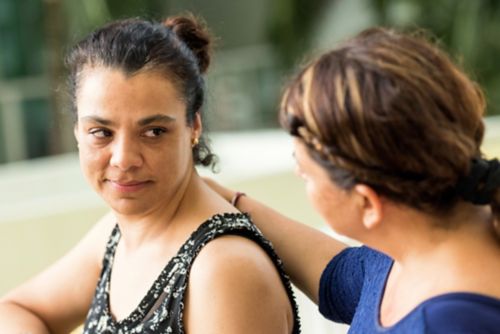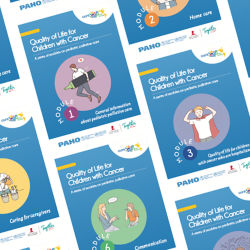Research Update: How to Support Grieving Parents

Educating families about what to expect as their child nears the end of life can help them in their grieving process.
For parents, the grief that follows a child’s death from cancer is life changing and lifelong. It increases their risk for mental and physical problems. It can strain marriages and friendships and make daily life a challenge. It can lead to job problems and money woes.
But our recent research found that is not the full story, even for parents in the first months and years following their child’s death.
As a palliative care physician and researcher, I work with many families of children who are at the end of life or have died of cancer. I am constantly amazed at the gratitude, kindness, and empathy they show for clinicians.
Despite suffering an unimaginable loss, many grieving parents still get up in the morning, take care of their partners and other kids, and tackle their responsibilities.
But it is not easy.
My colleagues and I wanted to know how to better support parents, particularly those who are early in their grief. These parents have not been studied as much as parents who were farther along. We also wanted to identify parents who needed extra support.
Here is what we did and learned.
What we did
We surveyed parents whose children had died of cancer 6 months to 2 years earlier. We heard from 128 parents of 88 children who were treated at 2 different medical centers.
Their answers provided clues about who might benefit most from more follow-up care and what services might be most helpful. The results may also help parents and their support circles better understand the grief process.
What we learned
The grief parents described was as varied as the children that had died. But they had certain things in common, including:
- Suffering: Parents, especially women, had elevated levels of depression, anxiety, post-traumatic stress disorder, and prolonged grief.
- Coping: Most parents in this study were starting to cope with their grief and to begin finding some meaning in their loss.
- Social functioning: The average parent still functioned socially and took care of their responsibilities despite this tremendous loss.
"Despite suffering an unimaginable loss, many grieving parents still get up in the morning, take care of their partners and other kids, and tackle their responsibilities."
What affects social functioning
Social functioning refers to an individual’s ability to interact with their environment. This includes work, social activities, and relationships with partners and family. We found two factors that influence social functioning of bereaved parents.
- End of life: Parents who felt prepared for the circumstances at the end of their child’s life were more likely to remain socially connected than parents who did not.
It may be impossible for any parent to be fully prepared for their child’s death. But almost 40% of parents in this study said they were not at all prepared for what happened at the end of their child’s life. They cited their child’s suffering and symptoms.
Visit the Grief and Bereavement section of the Together by St. Jude™ online resource to learn more about what parents can expect at the end of a child’s life. - Financial hardship: Bereaved parents with financial problems during treatment and after a child’s death were less socially connected. That leaves them at greater risk for psychological and physical health problems later.
Almost 40% of parents in this study said they struggled to pay the rent or mortgage on time and had limited savings.
Visit the Paying for Medical Care section of the Together by St. Jude™ online resource to learn more about managing the financial elements of cancer care.
Next steps
Here are some ways health care clinicians and others can support parents at the end of their child’s life and in the months and years that follow.
- Educate families about what to expect as their child nears the end of life.
- Encourage families to stay socially connected.
- Find ways to connect bereaved parents.
- Provide added support to families who are isolated socially.
- Check with families about financial struggles during treatment and bereavement.
- Partner with community groups, churches, and other groups to ease financial stress for grieving families.
If you are a parent or caregiver dealing with the death of a child, I invite you to explore the Grief and Bereavement section of the Together by St. Jude™ online resource. There you will find educational resources for handling grief, taking care of yourself, and supporting siblings.
Remember, you are not alone.
Read the research papers
Snaman JM, et al. Family characteristics and childcare patterns associated with early social functioning in cancer-bereaved parents. Cancer. 2024; 1-12. DOI:10.1002/cncr.35325
Snaman JM, et al. Early Bereavement Psychosocial Outcomes in Parents of Children Who Died of Cancer With a Focus on Social Functioning. JCO Oncol. Pract. 2023; 19, e527-e541. DOI:10.1200/OP.22.00538





